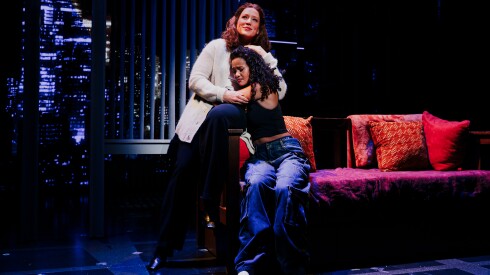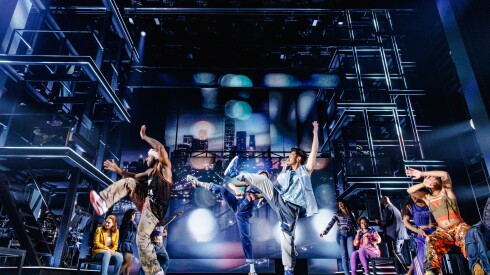There’s no denying the irresistible melodies and compelling storytelling that define Alicia Keys’ music. After all, the artist has won 17 Grammys and sold upward of 65 million albums, nabbing her the distinction of being named the 10th bestselling R&B artist of the 21st century.
“Hell’s Kitchen,” the Tony-winning jukebox musical featuring nearly two dozen songs from Keys’ remarkable catalogue, celebrates that music with glorious impact. But as is the downfall of many jukebox musicals, this is a case of remarkable music in the service of middling plot.
Still, “Hell’s Kitchen” is worth the price of a ticket for the music alone. The score is powered by immaculate vocals and ferociously enhanced by choreography by Camille A. Brown that captures the endless moods of Keys’ music with power and grace. Directed by Michael Greif and featuring orchestrations by Tom Kitt, Keys’ music is on fire.
Running through Nov. 30 at the Loop’s James M. Nederlander Theater, the story unfolds when Ali (Maya Drake) is 17. Keys has called the musical a labor of love that is “loosely autobiographical.” Loose is decidedly the operative word there.
Keys started playing the piano at around 7, was composing at 12 and signed by Columbia Records when she was 15. But in a decision as perplexing as it is frustrating, “Hell’s Kitchen” mentions none of this. In this telling, Ali hasn’t yet played a single piano note until the play begins.
Moreover, playwright Kristoffer Diaz’s book is cluttered with teenage tropes centered on boyfriend drama and fraught parental relationships. What we don’t get here is any real insight into Keys’ process or how she navigated an industry notorious for exploiting young artists.
Drake is luminous as Ali, her presence and vocals lighting up the production with the force and beauty of a meteor shower. The upbeat opener “Gospel” is an immersive, jubilant rendering of the titular neighborhood in the late 1990s.
This was the era of Rudy Giuliani, when Hell’s Kitchen was best known as the place Vito Corleone first settled in “The Godfather,” and had a reputation as a hotbed for crime. What the opening number of “In the Heights” does for Washington Heights, “Gospel” does for Hell’s Kitchen: renders the neighborhood as a place where vitality, ambition, beauty and joy live alongside struggle, despair and deeply rooted rage. Greif’s ensemble makes every “yeah yeah yeah” sound like an exaltation.
Still, the plot lumbers, paradoxically both shallow and overstuffed. “Hell’s Kitchen” takes on racist policing, parental abandonment, the stress of being a single mom and stubborn, destructive teenage rebellion, all little more than thinly sketched conceits.
It’s only when Keys’ piano teacher Miss Liza Jane arrives that we get a character whose depth and charisma matches the music. Portrayed by a majestic and hypnotic Roz White, she tells a sullen, angry Ali, “Your rage is real. Your rage is earned. I will not let pain defeat you.”
The moment is powerful enough to raise goosebumps. Ditto White’s take on “Perfect Way to Die,” when she seems to summon the trauma, fury and resilience of untold generations.
In addition to Miss Liza Jane, Ali’s immediate circle includes her boyfriend, Knuck (a velvet-voiced JonAvery Worrell), and her mother, Jersey (Kennedy Caughell, whose torrential belt hits like a tidal wave). Conflict arises when Jersey, who is white, calls the cops on Knuck, who is Black, simply for talking to her daughter. Also shaping Ali’s life, for better and for worse: her absentee father Davis (Desmond Sean Ellington, his vocals as smooth as silk).
Brown’s choreography fills the stage with an electric mix of hip-hop, breaking, Praise Dance, underground ballroom and modern movements that echo fellow New Yorker Alvin Ailey. Throughout, the ensemble moves with technical precision and athletic exuberance. (Watch for Marques Furr’s opening dance solo that accompanies the first measures of “Hallelujah/Like Water.” It is achingly beautiful, both plea and prayer embodied in movement.)
Everyone looks outstanding: Dede Ayite’s vibrant costumes capture the look of the late 1990s streetwear with Tommy Hilfiger gear, patchy denim, corsetry and crop-tops elevated by rhinestones and exquisite tailoring.
Projection designer Peter Nigrini makes the most of Robert Brill’s sliding-scaffolds set. At one point, images of trailblazing Black pianists — all women — form a silvery backdrop above the gleaming grand piano center stage. At another, a series of portraits of Black men flicker above, a haunting visual that speaks to the cost of dreams forever deferred.
In all, vocals, movement and visuals create the core of excellence that defines “Hell’s Kitchen,” even in the absence of a well-honed book. It’s a full-body immersion in music that spans the emotional spectrum, anger to elation, rage to revelation, anguish to ambition.

